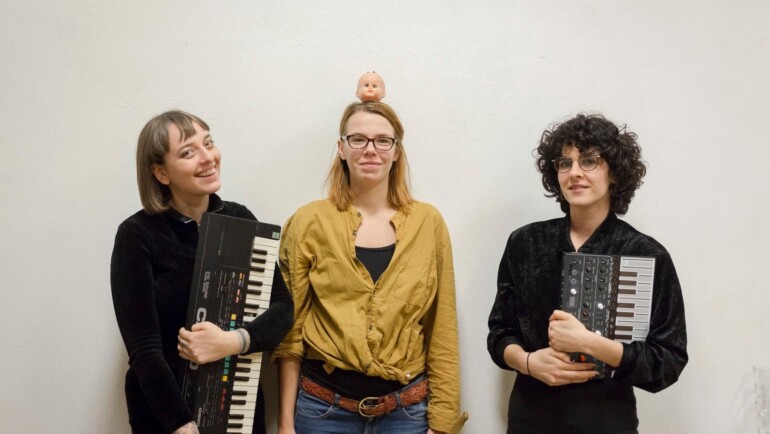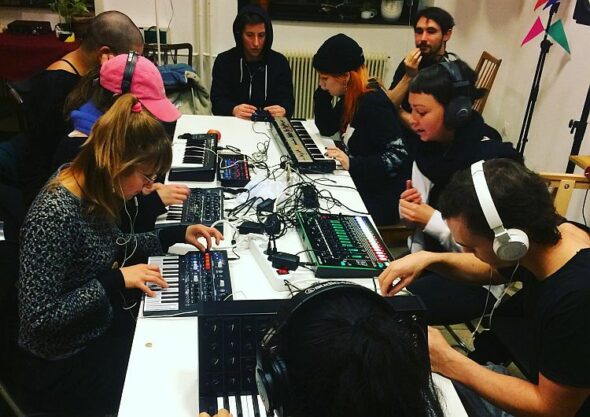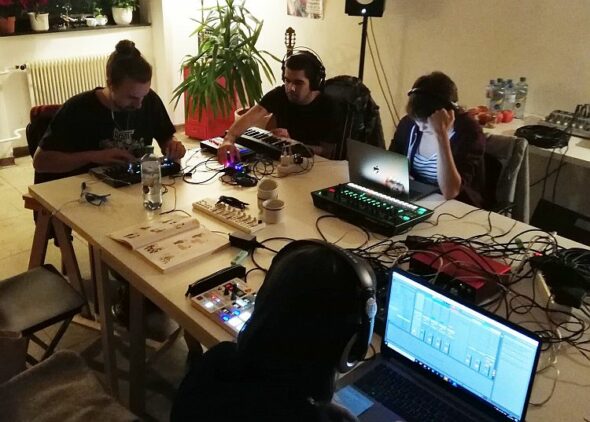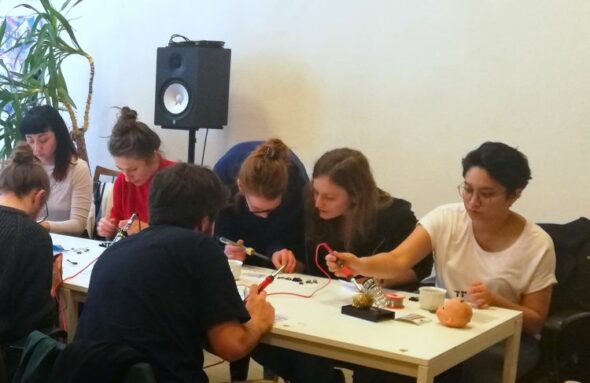
SOUNDS-QUEER-feminism means thinking socially, the community. The three activists of the Vienna DIY Synth Laboratory agree on this in the interview. Bianca Ludewig visited the collective at the end of February in the so far temporary “Creative Cluster Margareten”, where it found a permanent space for the first time last summer. To get into the “Creative Cluster” you have to call to have the door opened. On the second floor, right next to the synth lab, you can hear hip-hop sounds. This is where TURNTABLISTA, the DJ school for women, has its space and they are practicing hard. After the build-your-own-synth-workshop of SOUNDS QUEER? the artist Lisa Kortschak drops by and invites us to her finissage on the second floor, where she’s showing her brilliant sound installation “Out in the Closet” for the last time. A good preparation for the conversation with the three musicians ZOSIA HOŁUBOWSKA (MALA HERBA), ADELE KNALL (DRITTE HAND, UND DE SCHEENEN HOA, KNALL etc.) and VIOLETA GIL MARTÍNEZ (MATTE/GLOSSY) and an evening at the “Creative Cluster”.
Zosia, a few years ago you told me about your idea for queer workshops – how has the plan for Sounds Queer? developed so far? How did you three get together?
Zosia Hołubowska: The idea for Sounds Queer? started long before I came to Vienna. I did these workshops in Denmark and also in Australia, where I lived before, and also at some festivals in Poland and Ukraine. The idea developed more and more towards the exchange of knowledge and tools. When I moved to Vienna, I concentrated more and more on electronic music. In the beginning there was just me and a scholarship [kültür gemma! ;note]. I had been dreaming of creating a musical space since high school, and fifteen years later it has become a reality that we actually have a room to work in.
Adele Knall: I am a musician, I am studying at the Academy of Fine Arts and I am very much involved in cultural and social anthropology. Zosia and I met at the academy, where we attended a sound class together. Zosia then asked me if we wanted to do Sounds Queer? together.
Violeta Gil Martínez: I am also a musician. And a cultural manager. I got to know Zosia because she organized workshops and was alone at that time. I then suggested to her to give a workshop on the topic of “Circuit Bending”. And a few months later she asked me to become part of the collective.
Was it difficult to become an association or find a room? Do you want to say something about the room, about the building we are in right now?
Zosia Hołubowska: It was and is difficult in the sense that my German language skills are not enough for bureaucracy. Without Adele we would not have made it. But I must also say that we get a lot of support. Although we are a very young project and also a very idiosyncratic one, a niche project. We are now in the “Creative Cluster”, an old school in the 5th district of Vienna, which is in the middle of an experiment to become an art center and which houses over seventy artists, art studios and creative companies. And our space is a DIY synth lab, that’s what we call it.
“IT’S ABOUT EMPOWERMENT, SELF-EXPRESSION AND DIVERSITY.”

Why does Wien need Sounds Queer?
Adele Knall: It’s about empowerment, self-expression and diversity. But what does need mean – although it is important, it’s at the end of the chain of human needs.
Violeta Gil Martínez: Every city needs a sounds queer lab!
Adele Knall: Vienna needs it especially. I was interested in sounds and didn’t know where to go. Although I know some people who are working in this field, I felt that they were not so interested in telling me about it. How are power and accessibility distributed? Who knows how to solder or how a studio works? Most of the time in music it’s does not work out in a compliant way regarding queer, female or gender. There is no other place in Vienna that offers workshops like we do.
What is your definition of “queer” or queer activism?
Zosia Hołubowska: It was queer activism that gave me the idea of “queer” in the first place. I was active in the Rriott-Grrl-movement, for me it was never an academic theory but a lived experience. A utopia that was here and now. I always felt very trapped when I had to explain my gender identity, and “queer” was like an umbrella, a safe space where boundaries blur and you can start searching. When I was confronted with queer ideas, it was very intersectional, so important aspects were class, race, xenophobia, skills and limitations. And it was always connected to punk and the DIY culture. To do something for yourself and at the same time for others, that’s community. And this is the spirit we want to keep alive in this room. We think a lot about accessibility in intersectional terms. About who can afford it financially speaking. And since two of us are migrants, we also think about class and origin. Unfortunately we are here on the second floor without an elevator, actually we would like a barrier-free space. But this is the space we can afford at the moment. We want our workshops to be affordable, so we work without being paid and offer them for 15 Euros. But this is a volatile issue, maintaining an independent art space or running an association is often done under precarious conditions.
What role does feminism play in Sounds Queer? And what does feminism mean for you today?
Adele Knall: I haven’t heard this question for a long time. I can’t even remember when I realized I was a feminist. I grew up believing that we are all equal, even if I was not brought up that way. I had difficulty understanding why some things are different for girls; and I still have problems with that. When I was in school I was very fond of literature, but how many female writers do you read in school? Hardly any. But that’s how you experience the world when you grow up. So you think: literature is not for women. Most scientists are male, too. Already at school you are shown what “the women” do and what “the men” do.
“[…] WHEN YOU START RESEARCHING, YOU REALIZE THAT THERE ARE MANY WOMEN AND NON-BINARY PIONEERS IN ELECTRONIC MUSIC.”
Zosia Hołubowska: And it’s the same with electronic music, but when you start researching you realize that there are so many women and non-binary pioneers in electronic music. And it’s the same everywhere; and then you realize that this forms a narrative. Such as how archives are made and who writes these stories. And it seems to be no coincidence that some of these stories are left out. I can say that feminism has saved my life. And I have had first-hand experience with violence that comes with being a woman. I read “The Vagina Monologues” by Eve Ensler when I was fifteen years old. Being able to talk about my or a body without shame was a life-changing experience. There is no “queer” without feminism and vice versa.

Is there such a thing as a feminist or queer approach to music?
Violeta Gil Martínez: For us, it’s more about the approach of making music. Sound is fluid and can be many things. When you make music in a queer way, you are not looking for a particular sound or genre. For me, it is a freer approach to making music, without templates or constraints.
Zosia Hołubowska: My understanding of queer sounds is directly linked to queer activism, it’s about collaborative or collective composition. And it is also about decolonizing queer, creating a space for vulnerability and error. Women and non-binary people never have a place to learn, you always have to be perfect, otherwise you are immediately criticized. Sounds Queer? offers this necessary space.
“IT’S ABOUT PRIVILEGES, ABOUT POWER AND ACCESSIBILITY.”
Sounds Queer? does not only address women, but invites “women, femmes, queers, non-binary, trans, gender-non-conforming and gender-non-normative nerds”. So like other gender-sensitive festivals and projects, do you also address C-sharp male music nerds or male feminists?
Adele Knall: It’s about privileges, about power and accessibility. It’s about reflecting on one’s own position. So we’re kindly asking those who already have access to step back. But it is very important that this space remains accessible to everyone in principle, so that you can find out for yourself why this is important.
Violeta Gil Martínez: Many of the men who are coming to the workshops already have this in mind.

“WE DON’T HAVE A LIST OF ALLOWED IDENTITIES…”
Zosia Hołubowska: We don’t have a list of allowed identities, because that’s what queer philosophy actually rejects. We actually did not want to get involved in such a “door policy” or even “identity policy”. I think the name Sounds Queer? by itself does not attract people who are against feminism. Some were not that reflective, took up a lot of space within the workshop, but we never had anyone who was disrespectful. We are trying to question the way knowledge is disseminated. This master-disciple situation, to judge something as wrong or right… Some people have to experience for themselves what it feels like to be part of the minority.
Adele Knall: There was one participant who was a bit uncertain at the beginning, he was the only man in the workshop. Afterwards he came to me and said: “Adele, at first I didn’t understand it, but now I understand why it is super important what you are doing”.
Zosia Hołubowska: I don’t want to define myself as being against something. We are not in opposition to anything. I want to create a completely new dimension where the usual rules are challenged. We do not hide who we are. In Poland you have to maneuver a lot and you cannot name things for what they are. For me it’s rather a problem that I’m coming from a poor family in Eastern Europe and not that I am seen as a woman. In Austria nobody will say anything against me because I’m queer. But whenever I go to Poland, it’s better for me not to say anything about it. It is unimaginable what is going on there. One third of the country has been declared an LGBTQ-free zone. That‘s one reason why I‘m here.
How do you manage sounds queer? Do you apply for subsidies?
Adele Knall: We have hardly any time for ourselves, privately. So far we have had a project funding for our festival Sounds Queer?, which we did in January 2019, and a one-year funding by the MA 7 of the City of Vienna, which enabled us to open this space. The flying lab before was exhausting because we were always in new places and you had to constantly think about what the infrastructure is like there and what you have to bring along for a workshop.
Zosia Hołubowska: In the beginning we did the workshops with our private equipment only, which we also use as musicians. At the moment we are working on the financing of the workshops, so we are not getting paid for our work. The 15 Euro workshop fee is for the rent. A lot of time is still spent on the development and organization of Sounds Queer?
Adele Knall: We need financial means, because there’s a lack of tables, chairs, soldering irons or cables. But applications for financing take up time.
Two weeks later, after the outbreak of the corona crisis, a follow-up question: How is Sounds Queer? affected by the current corona situation? Or what are the consequences for you as artists?
Zosia Hołubowska: We had to cancel all events at Sounds Queer? We need the donations from these events for the studio rent. We are in the process of applying for funds, but at the moment we are not sure how to continue. As an artist I have lost all my income for the next two months. All my concerts, workshops and residencies have been cancelled until the end of April. Not only have I lost fees, but also the work I put into organizing all these performances. As a freelancer I am not entitled to social welfare. I applied for support from the COVID-19 fund, which was quite difficult because I don’t speak German well. I don’t know if I am entitled to help at all. The situation is dramatic and very frightening because there are so many militant, independent artists like me, who are living from hand to mouth and are depending on small underground spaces, which themselves are in big trouble. I’m trying to organize merchandise, digital publications and commissioned work, but at the moment I can’t even fully assess the extent of this crisis.
Zosia, the interview took place in February, it’s September now. How is Sounds Queer? coping with the current situation? Can workshops be done right now? *
Zosia Holubowska: We closed our studio in May, hoping we will return when the situation calms down. Today (30.September) we are hosting our first online workshop and in October we will present a new program of workshops that we will host at RES Radio.
You are invited perform at Unsound, together with choreographer and engineer Julia Giertz. The piece is called “Community of Grieving”. What can we expect? *
Zosia Holubowska: Together with Julia Gertz, a sound artist and performer from Sweden, I am creating an audio ritual to collectively deal with the grief over what we have lost because of the pandemic. We want to create a situation where it’s possible and safer to stay with these difficult and painful emotions. The piece comprises an audio composition to be listened to on headphones, a choreographic script to be done at home and a chat afterward (on the Unsound Discord channel) to talk about grief. It is inspired by the traditions of lamenting and evening liturgy knowns as Vesper, as well as ideas on deep listening and sonic meditations.
Thanks for the interview!
Bianca Ludewig
Translated from the German original by Julian Schoenfeld
* Actualized version by Shilla Strelka
Links:
Sounds Queer? (Website)
Sounds Queer? (Facebook)
Mala Herba (Bandcamp)
Adele Knall (Website)
Unsound 2020 gives the chance to experience “Community of Grieving” – a shared collective listening piece by Sounds Queer? founder Zosia Hołubowska and choreographer and engineer Julia Giertz, selected from the festival’s open call. Described as “an audio ritual to collectively submit into intermission”, the piece draws on traditions of vesper and lament and merging formats of sonic meditation, sonic narration, and audio-essay. The piece is created to be listened to at home on headphones in solitude, to give listeners a sense of being connected, belonging to a community of grieving.
Upcoming Date: 5. Oct. 2020 – 18:00 (online)
Please visit Unsound 2020 for more details.
